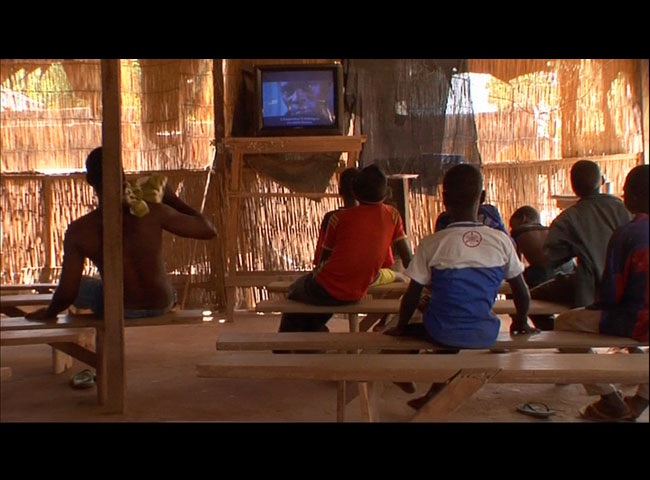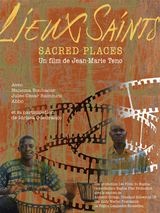Lieux saints
-
Réalisé par Jean-Marie Teno • Écrit par Jean-Marie Teno
-
France • 2009 • 70 minutes • DV Cam • Couleur
- Réalisation :
Jean-Marie Teno - Écriture :
Jean-Marie Teno - Image :
Chrystel Fournier - Son :
Jean-Marie Teno - Montage :
Christiane Badgley - Musique originale :
Jules César Bamouni, Franck Héral
- Production (structure) :
Les Films du Raphia - Participation :
Région Languedoc-Roussillon - Ayant droit :
Les Films du Raphia
- N° ISAN :
non renseigné
Résumé
À travers le portrait de 2 hommes, Jules César l'artiste artisan et Bouba le petit entrepreneur, Lieux Saints pose la question de l'accès à la culture dans un quartier populaire de Ouagadougou et montre comment le refus de la misère culturelle est devenu un des moteurs de lutte contre la misère économique.
Bouba, l'entrepreneur possède un vidéo-club dans lequel il diffuse des images provenant de VHS, des DVD d'origine indéterminée, contribuant ainsi à donner une vie culturelle a son quartier.
À la fois artisan et Artiste, Jules César fabrique, joue du djembe et initie les jeunes du quartier à la pratique de cet instrument. À l'instar du son, libre de circuler sans canaux particuliers, Jules César, dans son univers musical, va et vient dans la ville sur sa mob. une taille trop petite. Alors que l'univers de Bouba est l'image avec son organisation, ses machines, ses contraintes, son illégalité apparente, le business, son lot de frime avec ses belles chemises aux couleurs vives.
La complémentarité de mes 2 protagonistes s'est progressivement révélée à moi. Comme deux faces d'une médaille qui s'appellerait cinéma, ces deux personnages vont m'accompagner dans ma réflexion sur mon travail de cinéaste et plus généralement sur le rôle et la place du cinéma dans un continent où le cinéaste africain peine à diffuser ses œuvres.
Set in St-Leon, a modest neighbourhood tucked between the cathedral and two mosques in the city of Ouagadougou, the capital of Burkina Faso, where for 40 years, the world's famous FESPACO (Pan African Film Festival of Ouagadougou) showcases the best achievements of African filmmaking, "Sacred Places" is a film about the fight to survive and to maintain one's dignity in a hostile environment.
Through the lives of three characters: Jules Cesar, the djembé maker and player, Bouba, the video-club manager of a neighbourhood movie salon that also serves as a praying place, and Abbo a fifty years old senior technician who decided to become a public letter writer, JMT skilfully lays out his rich, very complex and profound observations on many paradoxes of today's Africa. One of the many contradictions the director displays is the absence of African films in African distribution at a time of remarkable technological advances:
"The digital era and the development of the internet have profoundly changed production, distribution and viewing of images around the world. With small budgets, independent films can be made and shown to the public in a matter of weeks or even days. Yet, despite this abundance of opportunities, having access to one's own images is still a distant dream for many in the cities and rural areas of Africa. It is in these places, where people are kept in the dark, with little hope on the horizon, where education and knowledge are needed the most ", says JMT.
Films of the award-winning Cameroonian filmmaker Jean-Marie Teno "collectively add up to a motion picture portrait of Africa. " Separately and together, they contribute a highly significant perspective to the struggles of Africans for self-identity and self-respect.
In his attempt to understand the present, JMT often investigates Africa's historical past. This time, however, the director turns his camera on his own profession, delving into the issues behind filmmaking in Africa today. "Sacred Places", JMT's new film, brings into view things that are personal, sacred and close to his heart: identity in times of globalization, the state of African cinema and the complicated relationship between art, popular culture and business. Honouring African traditions of oral culture, the director allows the richness of everyday conversations to place the film's weight on the words that are at the origin of any meaningful action.
Mot(s)-clé(s) thématique(s)
À propos du film
Comment avoir accès au film ?
- Sortie en salle
-
Édition DVD
- Il n'existe pas d'édition DVD à notre connaissance
-
Accès VOD
- Il n'existe pas d'accès en VOD à notre connaissance
- Diffusion non commerciale / Consultation


